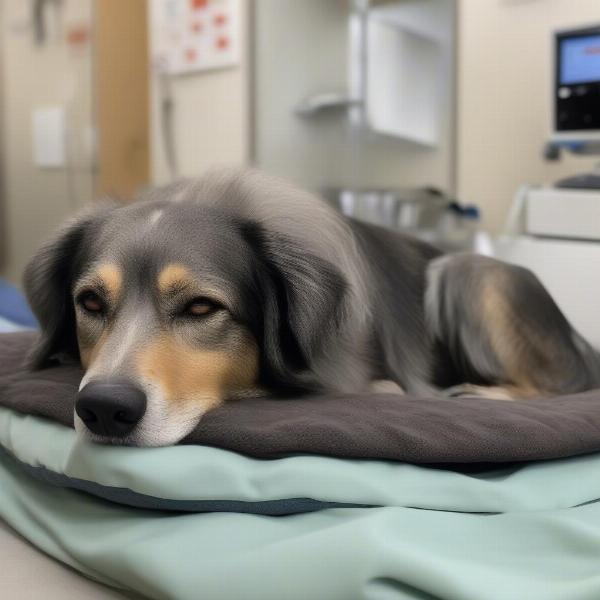If you’ve ever heard your dog yelping in sleep, you’re not alone. Many dog owners experience this and wonder if their furry friend is having a bad dream, experiencing pain, or if something else is going on. This article will explore the common reasons behind dog yelping in sleep, what it could mean, and when you should seek veterinary advice.
Why Do Dogs Yelp in Sleep?
Dogs, like humans, experience different sleep stages, including REM (Rapid Eye Movement) sleep. It’s during this deep sleep phase that dreaming occurs. During REM, muscles are relaxed, but brain activity is high. This can lead to vocalizations, twitching, and even running motions in their sleep as they act out their dreams. Your dog yelping in sleep is likely a normal part of this dreaming process, especially if it’s accompanied by other signs like paw movements or soft whimpering.
Is My Dog Having a Nightmare?
While we can’t know for sure what dogs dream about, their yelps and movements suggest they might be reliving experiences from their day, like chasing squirrels or playing fetch. If your dog appears distressed during these episodes, they might be experiencing something closer to a nightmare. However, in most cases, these vocalizations are nothing to worry about.
When to Worry About Dog Yelping in Sleep
Although yelping during sleep is usually harmless, there are instances where it could signal an underlying medical issue. Pay attention to the frequency, intensity, and context of the yelping.
Signs That Yelping Might Indicate a Problem:
- Frequent and intense yelping: If your dog yelps loudly and frequently during sleep, it might be a sign of pain or discomfort.
- Yelping accompanied by other symptoms: If the yelping occurs alongside restlessness, changes in appetite, lethargy, or other unusual behaviors, it’s essential to consult a vet.
- Sudden onset of yelping: If your dog has never yelped in its sleep before and suddenly starts, it’s wise to rule out any potential medical reasons.
- Older dogs: Senior dogs can be more prone to sleep disorders and cognitive decline, which may manifest as vocalizations during sleep.
 Senior Dog Sleeping and Yelping
Senior Dog Sleeping and Yelping
Potential Medical Causes of Yelping in Sleep:
- Pain: Arthritis, injuries, or other painful conditions can cause dogs to yelp in their sleep.
- Seizures: While less common, some seizures can occur during sleep and may involve vocalizations.
- Cognitive Dysfunction Syndrome (CDS): This condition, similar to dementia in humans, can affect senior dogs and cause changes in sleep patterns, including vocalizations.
Tips for Helping Your Yelping Dog
If you’re concerned about your dog’s yelping, consider the following:
- Create a comfortable sleep environment: A cozy bed, familiar surroundings, and a consistent bedtime routine can help your dog sleep more soundly.
- Rule out medical issues: Consult your veterinarian to ensure there are no underlying health problems causing the yelping.
- Avoid waking your dog abruptly: If you need to wake your dog during a yelping episode, do so gently and calmly. Start by softly speaking their name.
Conclusion
While dog yelping in sleep is usually a normal part of the dreaming process, it’s important to be aware of the signs that could indicate a more serious issue. By paying close attention to your dog’s behavior, creating a comfortable sleep environment, and consulting your veterinarian when necessary, you can help ensure your furry friend enjoys peaceful and restful nights. If you notice any concerning changes in your dog’s sleep patterns, don’t hesitate to seek professional advice.
FAQ
-
Is it normal for my dog to twitch and yelp in its sleep? Yes, twitching and yelping during sleep are typically normal signs of dreaming in dogs.
-
Should I wake my dog if it’s yelping in its sleep? Generally, no. Unless your dog seems distressed or the yelping is frequent and intense, it’s best to let them sleep.
-
How can I tell if my dog’s yelping is due to pain? Look for other signs like limping, changes in appetite, or reluctance to move. If you suspect pain, consult your vet.
-
Can medications cause yelping in sleep? Some medications can have side effects that affect sleep patterns. Discuss any concerns with your veterinarian.
-
What should I do if my senior dog starts yelping in its sleep? Consult your veterinarian to rule out age-related conditions like Cognitive Dysfunction Syndrome.
-
Is there anything I can do to help my dog have fewer nightmares? A consistent routine, plenty of exercise, and a calming bedtime environment can promote better sleep.
-
When should I be concerned about my dog’s sleep vocalizations? Consult your vet if the yelping is frequent, intense, accompanied by other symptoms, or has a sudden onset.
Related Articles
when to put a dog down with wobblers
About ILM Dog
ILM Dog is your trusted international resource for expert advice on dog care and wellbeing. We provide comprehensive information on a range of topics, from breed selection and puppy care to senior dog health, training, nutrition, and grooming. We strive to empower dog owners worldwide with the knowledge they need to provide the best possible care for their beloved companions. For expert advice tailored to your dog’s specific needs, contact our team at [email protected] or call us at +44 20-3965-8624.